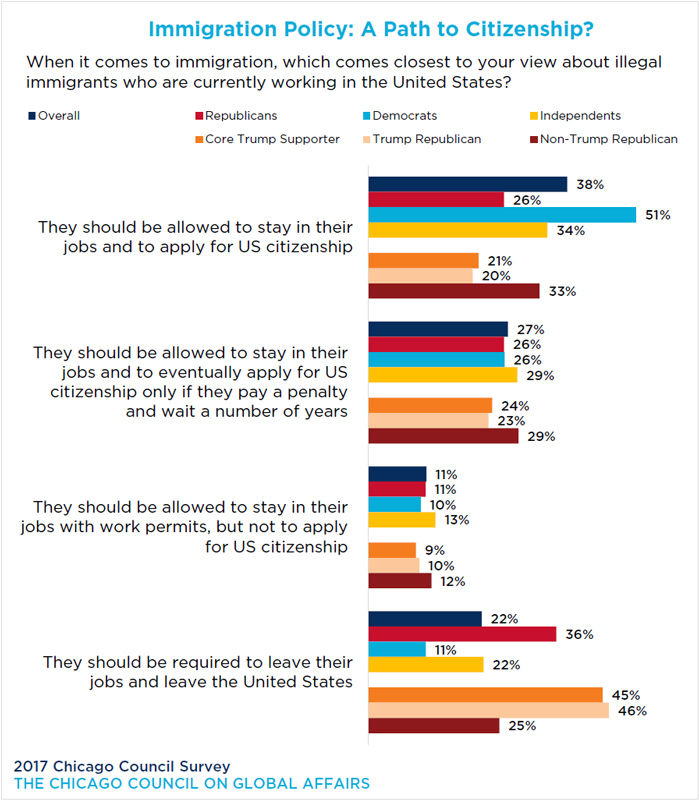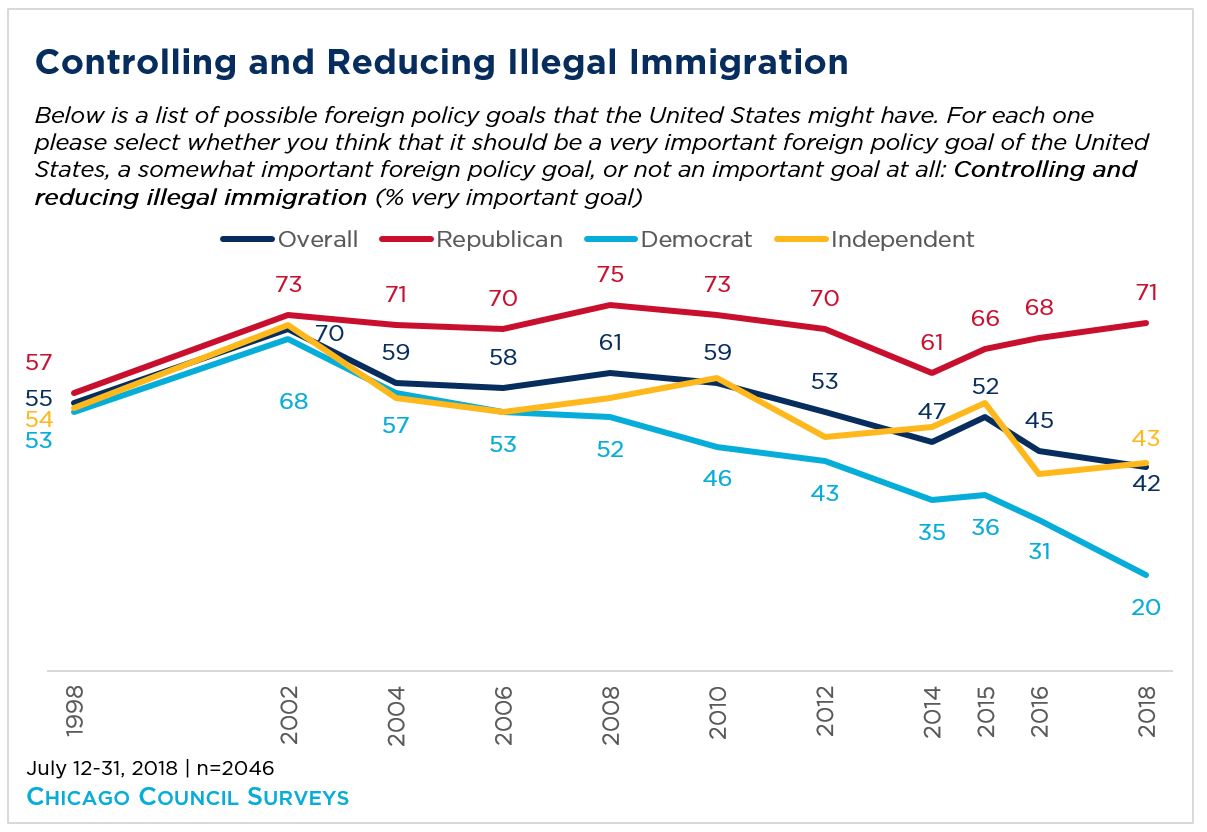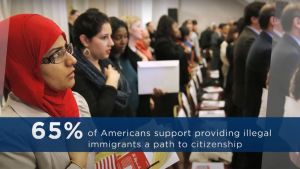Despite the Trump administration’s approach to immigration, survey data reveals growing support for a pathway to citizenship for unauthorized workers.
Views of Immigrants and Refugees as a Critical Threat Hit New Lows
The White House recently presented a 70-point list of immigration policy recommendations to Congress, ranging from the construction of a border wall to a crackdown on “sanctuary cities” to deep cuts to legal immigration and refugee resettlement. The memo comes on the heels of the administration’s decision to end the Deferred Action for Childhood Arrivals (DACA) program, which provided temporary work permits and relief from deportation for young undocumented immigrants.
Despite the Trump administration’s enforcement and security-focused approach to immigration policy, the 2017 Chicago Council Survey reveals growing support for a pathway to citizenship for unauthorized workers and an all-time low in Americans’ perception of immigration as a threat.
More Agreement on Path to Citizenship for Unauthorized Immigrants
A majority of Americans across party lines support allowing unauthorized immigrants currently working in the United States to apply for US citizenship, either immediately or after paying a penalty and waiting a number of years. Combined, two-thirds (65%) support a path to citizenship with or without conditions, up from 58% in 2016.
Conversely, fewer Americans now say that unauthorized immigrants should be required to leave their jobs and the United States (22%, down from 31% in 2013). Core Trump supporters1—those Americans with a very favorable view of President Trump—are the most inclined to support deportation. But even they are divided in& their views, with equal numbers supporting deportation and citizenship.

The divide between Republicans and Democrats on providing a pathway to citizenship is significant, at 25 percentage points. There is also a large split—19 percentage points—within the Republican party between ‘Trump Republicans’—those Republicans with a very favorable view of President Trump—and ‘non-Trump Republicans’.2 Trump Republicans, like core Trump supporters, are divided between supporting deportation (46%) and a path to citizenship (43%) for unauthorized immigrants working in the United States. But non-Trump Republicans are much closer to overall public opinion: six in ten (62%) favor a path to citizenship, while one in four (25%) back deportation.
Polls on the fate of undocumented immigrants brought to the US as young children—the target group for the DACA program, and often referred to as ‘Dreamers’—have found similar or higher levels of support allowing these for a path to US citizenship. A POLITICO poll conducted August 31-September 3 found six in ten Americans (58%) supported allowing Dreamers to stay in the US and pursue citizenship if they met certain requirements. And an ABC News/Washington Post poll conducted September 18-21 found that nearly nine in ten Americans (86%) support “a program that allows undocumented immigrants to stay in the United States if they arrived here as a child, completed high school or military service and have not been convicted of a serious crime.” In fact, support for this DACA-like program was higher alone than when combined with a package of increased border security spending (65% supported this combination).
Public Perception of Immigrants as Threat at All-Time Low
Americans’ growing support for providing unauthorized immigrants with a path to citizenship comes as concerns about immigration have declined more generally. Over the past two decades, Americans’ perceptions of immigration as a threat have fallen steadily. Only 37 percent of Americans overall say that immigration is a critical threat, down from 43 percent in 2016, marking an all-time low since this question was first asked in 1998.
This overall decline is being led by a dramatic decline in concern among Democrats, followed by Independents, with both groups reaching historic lows. Republicans have largely held steady in their concern over the past two decades, with roughly six in ten consistently saying that large numbers of immigrants and refugees coming into the US represents a critical threat. These two trends—continued Republican concern and falling Democratic fears—combine to produce a 41 percentage point partisan gap, the widest yet on this question.

Despite the overall decline in concern over the past decade, the issue remains a potent one for the President’s strongest supporters: core Trump supporters are the most likely to say that large numbers of immigrants and refugees coming into the US represents a critical threat (80%). The question of the threat posed by immigrants and refugees coming into the US doesn’t just divide Republicans and Democrats—it also splits the Republican party. While Trump Republicans are very concerned about the issue (with 79% naming it a critical threat), non-Trump Republicans are far less concerned: only four in ten (42%) see it as a critical threat, placing them close to overall American opinion.
Conclusion
Congressional debates around the future of DACA recipients and other groups of undocumented immigrants will need to balance Trump’s call for enforcement with the public’s growing recognition of the contributions of immigrants and support for permanent pathways to citizenship. And though advocates’ calls for “clean” legislation to support DACA recipients may prove to be a pipe dream in a Congress that is bitterly divided on the issue of immigration, strong public support for a pathway for unauthorized workers—including DACA youth and their families—should ensure that the issue garners serious consideration in a Congress increasingly accused of putting partisan interests before practical legislative solutions.
Methodology
The analysis in this report is based on data from the 2017 Chicago Council Survey of the American public on foreign policy. The 2017 Chicago Council Survey was conducted by GfK Custom Research using their large-scale, nationwide online research panel between June 27 and July 19, 2017 among a weighted national sample of 2,020 adults, 18 years of age or older, living in all 50 US states and the District of Columbia. The margin of error is ±2.4 percentage points.
Partisan identification is based on respondents’ answer to a standard partisan self-identification question: “Generally speaking, do you think of yourself as a Republican, a Democrat, an Independent, or what?”
Core Trump supporters are identified as those respondents who answered “very favorable” to the question: “Do you have a very favorable, somewhat favorable, somewhat unfavorable, or very unfavorable view of the following world leaders: US President Donald Trump?” This group, 21 percent of the overall sample, self-identify primarily as Republicans (62%), but also includes a third that identify as Independents (31%), and a handful of Democrats (5%).
Trump Republicans, 14 percent of the overall sample, are defined as those Republicans who answered “very favorable” to the question: “Do you have a very favorable, somewhat favorable, somewhat unfavorable, or very unfavorable view of the following world leaders: US President Donald Trump?” Non-Trump Republicans, 13 percent of the overall sample, are defined as those Republicans who answered “somewhat favorable”, “somewhat unfavorable,” or “very unfavorable” to that same question. Among self-identified Republicans, 51 percent are “Trump Republicans” and 47 percent are “non-Trump Republicans.”
- 1
Core Trump supporters constitute 21 percent of the overall sample; 62% self-identify as Republicans, 31% as Independents, and 5% as Democrats. See methodology for details.
- 2
Core Trump supporters constitute 21 percent of the overall sample; 62% self-identify as Republicans, 31% as Independents, and 5% as Democrats. See methodology for details.




 Play
Play
The 2017 Chicago Council Survey reveals growing American support for a pathway to citizenship for unauthorized workers and an all-time low in perception of immigration as a threat.


